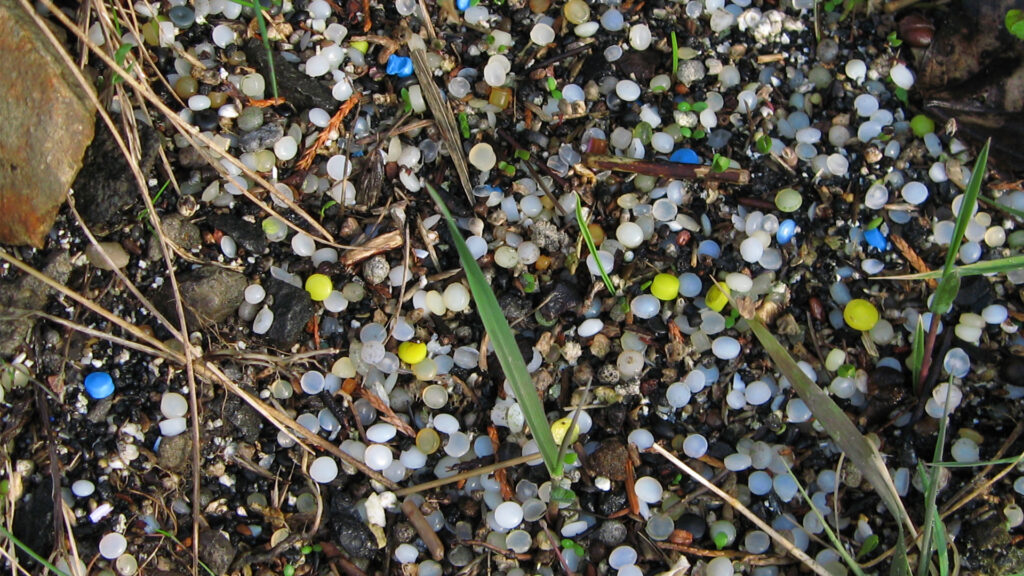By Mia McCormick, Environment Florida
Plastic pollution comes in many forms. You may be used to picking up candy wrappers, drink bottles, straws or foam containers on a beach cleanup. But some of the smallest and most dangerous pollution is not that easy to see.
Plastic pellets, sometimes called nurdles, are what manufacturers inject into molds to create the larger items we see everyday. They are made from various raw materials but most commonly crude oil, which is processed physically and chemically to create polymer resins formed into pellets. Each pellet is about the size of a lentil.
Why are they plastic pollution?
Plastic pellets create pollution in several ways. First, the process described above to create pellets is fossil fuel intensive. Extracting the crude oil, processing it and then creating the chemical bonds that form plastic leaves a trail of disgusting toxic pollution.

Next, the pellets are transported to manufacturers where they are injected into molds to become products. They travel by railroad, ship and highway and are often dumped or spilled along the way. An estimated 10 trillion are expected to fall into marine habitats around the world each year.
It’s shocking to imagine that much pollution without regulations or consequences when it’s dumped. In Florida, plastic pellets have been found by the hundreds near train tracks, shipping ports or washed up on beaches.
Because they are so small, pellets can often end up on the floor of a processing or manufacturing facility. They are cheap and easily contaminated, so many are simply washed out into area streams and waterways with the discharge.
In our waterways, plastic pellets become dangerous. Can you tell the difference between a pellet and a fish egg just by looking at it? They are the same size and shape as fish eggs and are often eaten by turtles, birds and fish who mistake them for food. Once inside the digestive tract they can cause all kinds of issues, even death.
The toxins that are inherent in these pellets can bioaccumulate in fish and spread to us when we eat them. Plastic pellets don’t belong in Florida’s pristine waters or in the bellies of our beautiful wildlife.
Who is responsible when they spill?
Under the federal Clean Water Act, states can issue permits to factories and plastic producers limiting what pollution can enter waterways. But there is no federal limit on plastic pellets. And when spills are large, state and federal organizations often have to coordinate cleanup efforts with the responsible party.
Since there are no laws or consequences set on pellet spills, they are left to accept any voluntary cleanup effort that’s made, regardless of how effective it is.
Where are people finding them in Florida?
Clean water organizations and volunteers have documented pellet dumping and spills across the southern U.S., including in Florida, Texas, South Carolina and Louisiana. More than 600 pellets were found near train tracks by Tallahassee’s Upper Lake Lafayette. A similar amount was found in Dr. Von D Mizell-Eula Johnson State Park just south of Fort Lauderdale near Port Everglades.
Volunteers from many towns along the Atlantic coast and in the Keys have reported finding pellets near the water. Early collection evidence shows that areas close to railroad tracks, ports and plastic production facilities are where they tend to collect in the environment.
What’s being done?
In March, Reps. Mike Levin (CA-49) and Mary Peltola (AK-At Large) introduced the Plastic Pellet Free Waterways Act to the House. This act would make it illegal to discharge plastic pellets into our waterways.
The bill has bipartisan support and over 60 cosponsors. Now we ask our U.S. senators to support the Senate version of the bill.
Take action and join our Summer Pellet Patrol
Environment Florida is joining forces with environmental advocates from all over the state to hold a series of pellet patrols. Similar to a cleanup, a group will meet and head out to a beach or local waterway to hunt for pellets.
We’ll record the findings from each location and use that data to show members of Congress that passing the Plastic Pellet Free Waterways Act is in the best interest of Floridians and our wildlife. A list of Summer Pellet Patrol locations can be found at https://bit.ly/summerpelletpatrol.
Mia McCormick is an advocate with Environment Florida, a policy and action group with one mission: to build a healthier, greener Sunshine State. This piece was originally published at https://environmentamerica.org/florida/articles/tiny-plastic-pollution-is-a-big-threat-to-florida-marine-life/.
If you are interested in submitting an opinion piece to The Invading Sea, email Editor Nathan Crabbe at ncrabbe@fau.edu. Sign up for The Invading Sea newsletter by visiting here.



